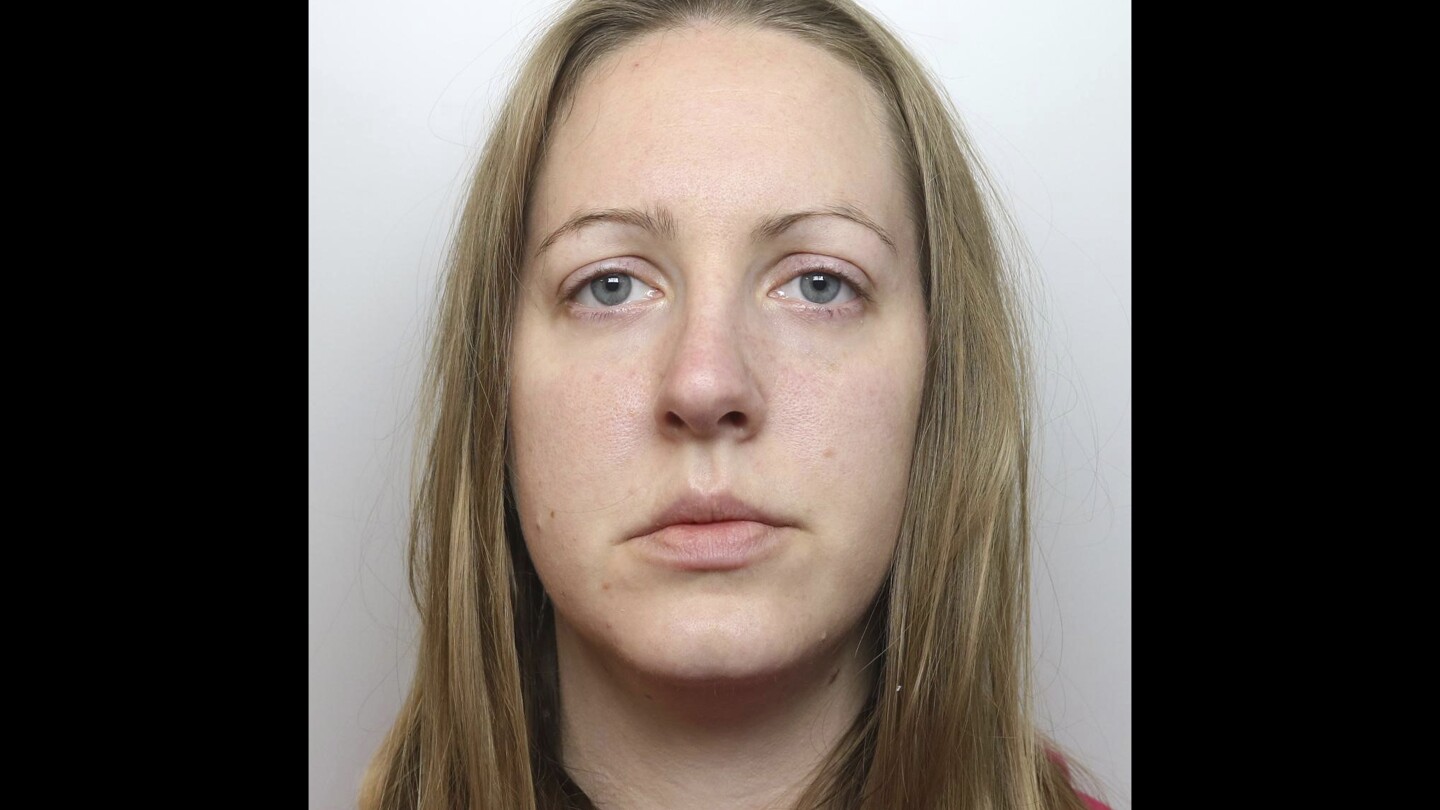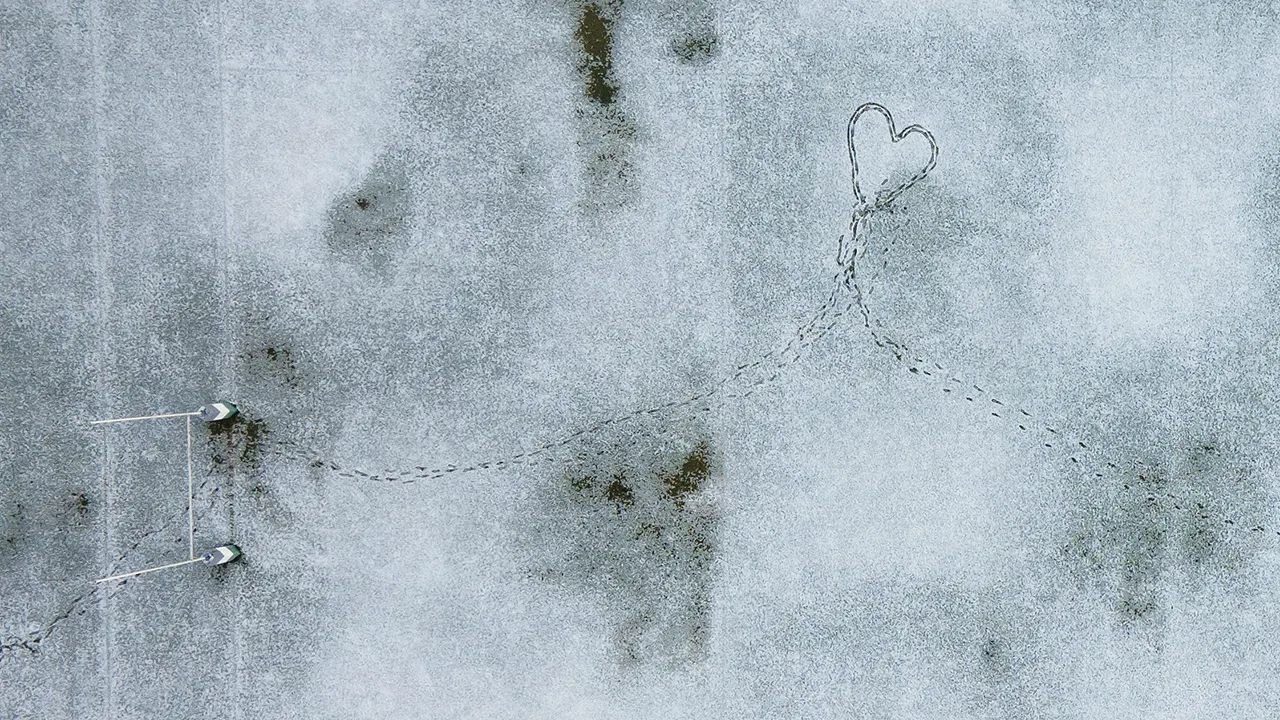World
UK judge set to sentence Lucy Letby, the most prolific child killer in modern UK history

LONDON (AP) — A judge on Monday is set to sentence Lucy Letby, the most prolific child killer in modern U.K. history, for murdering seven babies and attempting to kill six others while working as a neonatal nurse at a hospital in northern England.
Justice James Goss could level the most severe sentence possible under British law by imposing multiple life terms to ensure that Letby will spend the rest of her life behind bars.
Following 22 days of deliberation, a jury at Manchester Crown Court convicted Letby, 33, of killing the babies over a yearlong period that saw her prey on the vulnerabilities of sick newborns and their anxious parents.
The victims died in the neonatal unit at the Countess of Chester Hospital in northwest England between June 2015 and June 2016.
Letby did not attend the hearing. That has fueled anger from the families of the victims, who wanted her to listen to statements read out in court by the parents of her victims about the devastation caused by her crimes.
“You thought it was your right to play God with our children’s lives,” the mother of twins, one of whom was murdered and the other whom Letby tried to kill, said in a statement to the court.
Politicians and victim advocates have called for changes in the law to force criminals to appear for sentencing after several high-profile convicts chose not to face their victims in recent months.
During Letby’s 10-month trial, prosecutors said that in 2015 the hospital started to see a significant rise in the number of babies who were dying or suffering sudden declines in their health for no apparent reason.
Some suffered “serious catastrophic collapses” but survived after help from medical staff.
Letby was on duty in all of the cases, with prosecutors describing her as a “constant malevolent presence” in the neonatal unit when the children collapsed or died. The nurse harmed babies in ways that were difficult to detect, and she persuaded colleagues that their collapses and deaths were normal, they said.
Senior doctors said over the weekend that they had raised concerns about Letby as early as October 2015 and that children might have been saved if managers had taken their concerns seriously.
Dr. Stephen Brearey, head consultant at the Countess of Chester Hospital’s neonatal unit, told the Guardian newspaper that deaths could arguably have been avoided as early as February 2016 if executives had “responded appropriately” to an urgent meeting request from concerned doctors.
Letby was finally removed from frontline duties in late June of 2016. She was arrested at her home in July 2018.
An independent inquiry will be conducted into how the hospital responded to the deaths.

World
Ukraine's divisive mobilization law comes into force as a new Russian push strains front-line troops
KYIV, Ukraine (AP) — A divisive mobilization law in Ukraine came into force on Saturday, as Kyiv struggles to boost troop numbers after Russia launched a new offensive that some fear could close in on Ukraine’s second-largest city.
The legislation, which was watered down from its original draft, will make it easier to identify every conscript in the country. It also provides incentives to soldiers, such as cash bonuses or money toward buying a house or car, that some analysts say Ukraine cannot afford.
Lawmakers dragged their feet for months and only passed the law in mid-April, a week after Ukraine lowered the age for men who can be drafted from 27 to 25. The measures reflect the growing strain that more than two years of war with Russia has had on Ukraine’s forces, who are trying to hold the front lines in fighting that has sapped the country’s ranks and stores of weapons and ammunition.
Ukrainian President Volodymyr Zelenskyy also signed two other laws Friday, allowing prisoners to join the army and increasing fines for draft dodgers fivefold. Russia enlisted its prisoners early on in the war, and personnel shortages compelled Ukraine to adopt the new measures.
Russian troops, meanwhile, are pushing ahead with a ground offensive that opened a new front in northeastern Ukraine’s Kharkiv region and put further pressure on Kyiv’s overstretched military. After weeks of probing, Moscow launched the new push knowing that Ukraine suffered personnel shortages, and that its forces have been spread thin in the northeast.
Russian President Vladimir Putin said on Friday during a visit to China that the Russian push aims to create “a buffer zone” rather than capturing Kharkiv, the local capital and Ukraine’s second-largest city.
Still, Moscow’s forces have pummeled Kharkiv with strikes in recent weeks, hitting civilian and energy infrastructure and prompting angry accusations from Zelenskyy that the Russian leadership sought to reduce the city to rubble. On Friday, Mayor Ihor Terekhov said that Russian guided bombs killed at least three residents and injured 28 others that day.
Moscow denies deliberately targeting civilians, but thousands have died or suffered injuries in the more than 27 months of fighting.
The U.S. last week announced a new $400 million package of military aid for Ukraine, and President Joe Biden has promised that he would rush badly needed weaponry to the country to help it stave off Russian advances. Still, only small batches of U.S. military aid have started to trickle into the front line, according to Ukrainian military commanders, who said it will take at least two months before supplies meet Kyiv’s needs to hold the line.
Thousands of Ukrainians have fled the country to avoid the draft since Russia’s all-out invasion in February 2022, some risking their lives as they tried to swim across a river separating Ukraine from neighboring Romania and Hungary.
Late on Friday, Ukraine’s border service said that at least 30 people have died trying to cross the Tisza River since the full scale-invasion.
Romanian border guards days earlier retrieved the near-naked, disfigured body of a man that appeared to have been floating in the Tisza for days, and is the 30th known casualty, the Ukrainian agency said in an online statement. It said the man has not yet been identified.
___
Follow AP’s coverage at https://apnews.com/hub/russia-ukraine
World
An unusual autumn freeze grips parts of South America, giving Chile its coldest May in 74 years

Chileans are bundling up for their coldest autumn in more than 70 years mere days after sunning in T-shirts — a dramatic change of wardrobe brought on this week by a sudden cold front gripping portions of South America unaccustomed to bitter wind chills this time of year.
CHILE SHUTS DOWN A POPULAR GLACIER, SPARKING DEBATE OVER CLIMATE CHANGE AND ADVENTURE SPORTS
Temperatures broke records along the coast of Chile and in Santiago, the capital, dipping near freezing and making this month the coldest May that the country has seen since 1950, the Chilean meteorological agency reported.
An unusual succession of polar air masses has moved over southern swaths of the continent, meteorological experts say, pushing the mercury below zero Celsius (32 Fahrenheit) in some places. It’s the latest example of extreme weather in the region — a heat wave now baking Mexico, for instance — which scientists link to climate change.
Footprints create the shape of a heart in a snow-covered rugby field in Santiago, Chile, Wednesday, May 8, 2024. (AP Photo/Matias Basualdo)
“The past few days have been one of the longest (cold fronts) ever recorded and one of the earliest ever recorded” before the onset of winter in the Southern Hemisphere, said Raul Cordero, a climatologist at Santiago University. “Typically the incursions of cold air from the Antarctic that drive temperatures below zero occur from June onwards, not so much in May.”
The cold front sweeping in from Antartica has collided with warm air pushing in from the northwestern Amazon, helping fuel heavy rainstorms battering Brazil, according to that country’s National Meteorological system.
Chile’s government issued frosty weather alerts for most of the country and ramped up assistance for homeless people struggling to endure the frigid temperatures on the streets. Snow cloaked the peaks of the Andes and fell in parts of Santiago, leading to power outages in many areas this week.
“Winter came early,” said Mercedes Aguayo, a street vendor hawking gloves and hats in Santiago.
She said she was glad for a boost in business after Chile’s record winter heat wave last year, which experts pinned on climate change as well as the cyclical El Niño weather pattern.
“We had stored these goods (hats and gloves) for four years because winters were always more sporadic, one day hot, one day cold,” Aguayo said.
This week’s cold snap also took parts of Argentina and Paraguay by surprise.
Energy demand soared across many parts of Argentina. Distributors cut supplies to dozens of gas stations and industries in several provinces to avoid outages in households, , the country’s main hydrocarbon company, CECHA, said Thursday.
World
Brussels, my love? Transparency over MEPs' side jobs

In this edition, we look at what lawmakers’ extracurricular activities mean for their core role.
This week, we are joined by Sophia Russack, senior researcher from the Centre for European Policy Studies, Petros Fassoulas, secretary general of European Movement International and Anna Nalyvayko, senior project officer from the Wilfried Martens Center.
Panelists debate the ethical questions raised by MEPs who have side jobs. Those extra roles are legal, but the political earthquake caused by the Qatarargate scandal led to tighter rules and more transparency.
Is this enough to bridge the gulf between citizens and politicians, in today’s fractured political landscape?
“We see that they have improved rules when it comes to reporting requirements, to laying open your financial situation before and after the offers, and so on. But to be honest, none of these things will prevent another Qatargate,” said Sophia Russack, a think tanker who is an expert in EU institutional architecture, decision-making processes and institutional reform.
Despite these concerns, Petros Fassoulas said MEPs shouldn’t abandon contact with the real world altogether.
“It’s important for them to have the opportunity to bring expertise from outside and engage also with the world outside of the chamber,” Fassoulas said. “An MEP or any parliamentarian should be in contact with the people that they regulate, the businesses that they have an impact on.”
Guests also discussed the reasons for the crisis of public confidence in politicians, and gave some ideas for solutions.
Watch “Brussels, my love?” in the player above.
-

 World1 week ago
World1 week agoPentagon chief confirms US pause on weapons shipment to Israel
-

 Politics1 week ago
Politics1 week agoRFK Jr said a worm ate part of his brain and died in his head
-

 Education1 week ago
Education1 week agoVideo: Police Use Pepper Spray on Protesters on G.W.U.’s Campus
-

 Politics1 week ago
Politics1 week agoOhio AG defends letter warning 'woke' masked anti-Israel protesters they face prison time: 'We have a society'
-

 Politics1 week ago
Politics1 week agoBiden’s decision to pull Israel weapons shipment kept quiet until after Holocaust remembrance address: report
-

 World1 week ago
World1 week agoA look at Chinese investment within Hungary
-

 News1 week ago
News1 week agoThe Major Supreme Court Cases of 2024
-

 World6 days ago
World6 days agoIndia Lok Sabha election 2024 Phase 4: Who votes and what’s at stake?

















